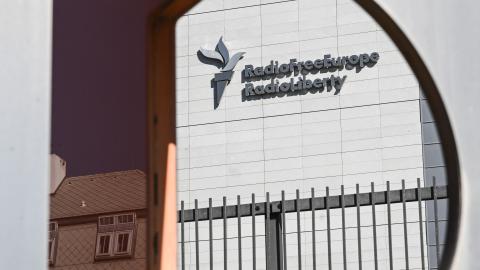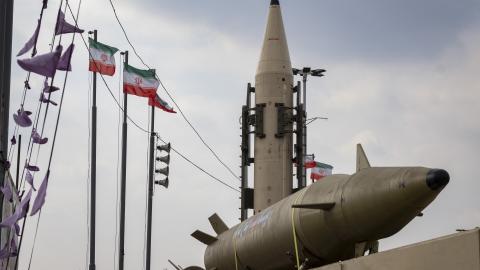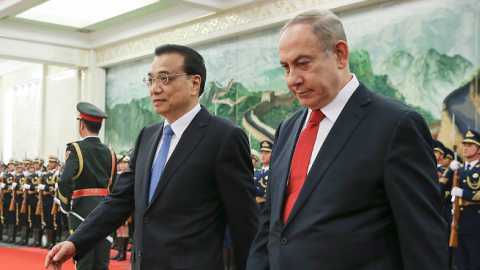With elections now over and a nationalist, centre-right coalition poised to govern for the foreseeable future, expect Jerusalem to move to cool what has been a remarkable, decade-long Sino-Israeli romance. The change will not be immediate or obvious.
Instead, it will be cumulative and subtle. It will unfold over the next 12-18 months and it will seek to selectively blunt Beijing’s investment and diplomatic push into Israel and the region, even as Jerusalem tries to build upon the positive aspects of its economic relationship with Beijing. Israel has reached “peak China”.
Like other peak narratives when they first emerge, such a shift by Israel seems contrary to the zeitgeist. From Tel Aviv to Haifa to the Negev, signs of a booming Sino-Israeli economic, technological and cultural collaboration are everywhere. In the last decade alone, the annual value of Israel-China merchandise trade has doubled to well over US$10 billion.
There are now several bilateral governmental dialogues aimed at forging technology collaboration; numerous academic and cultural exchange programmes; and substantial and increasing Chinese direct and indirect (through venture capital funds) investment in Israeli start-ups and companies – especially in the technology sector.
For Israel, the boom has largely been organic and ad hoc (at least until recently), driven primarily by a globally minded private sector seeking dynamic new markets, much as it had previously done with Japan and India.
For China, the calculus has been more intentional: Israel’s technology talent and innovative capacity are well suited to assist Beijing in its quest for global leadership in areas such as cybersecurity, surveillance, biotechnology, artificial intelligence and advanced manufacturing; and Israel’s location in the eastern Mediterranean makes it an ideal hub to connect Europe and Asia under China’s “Belt and Road Initiative”.
Despite the relationship’s momentum, there are at least two, mutually reinforcing reasons why the idea of “peak China” should be taken seriously.
First, Israelis care deeply about America’s views and the US strongly opposes those aspects of the Sino-Israeli relationship that could bring Israel firmly into China’s Belt and Road Initiative orbit or that might meaningfully contribute to China’s “Made in China 2025” road map for global technology leadership.
Second, Israel’s new nationalist, centre-right coalition will independently catalyse a reassessment of the Sino-Israel relationship, especially one encouraged by the US. In fact, this reassessment is already under way inside the Israeli think tanks and people networks that are best positioned to have the new government’s ear.
The US has long been Israel’s most important and reliable ally. Even so, no US president has been as supportive of Israeli government policies as President Donald Trump.
In just two years, Trump has withdrawn the US from the Iran nuclear deal, moved the US embassy to Jerusalem, and recognised Israeli sovereignty over the Golan Heights – and he has done so after a two-term Obama presidency, which marked one of the rockiest periods in the history of US-Israel relations.
While Trump has justified these actions on the basis of US interests, each of these moves has been enthusiastically welcomed by Prime Minister Benjamin Netanyahu and several of the political figures who are expected to join his new government. Jerusalem will not be browbeaten into backing policies it disagrees with.
However, this singular history of support for Israeli policies will guarantee that Trump’s opinions will be deemed exceptionally worthy of being heard. That the president’s perceived support for Netanyahu is also believed to have helped propel Netanyahu to victory will create a personal overlay – for Trump, as well as Bibi – to this dynamic.
While US views will be important, it would be a mistake to attribute an eventual recalibration of Israel’s China policy to US pressure alone.
Because of the ad hoc genesis of Israel’s relationship with China and the historic regional focus of its security establishment, Israel has not fully metabolised how it fits into a new pattern of intense US-China economic and strategic competition. In this limited sense, it has been on a strategic holiday. This is now changing.
For the first time in a decade, a small but growing number of influential Israelis have begun to publicly question the economic, political and strategic logic of Israel’s relationship with China. First, Israel’s security and economic vitality depends on preserving and optimising the fruits of its deep pools of intellectual capital and innovative capacity.
China’s long-standing reputation for violating intellectual property rights and imposing legal or de facto requirements on foreign firms that are designed to facilitate technology transfer to China is increasingly worrisome to Israeli policymakers newly aware of how the loss of Israeli IP to China is at odds with the nation’s core interests.
Second, extensive Chinese investment and other commercial involvement with Israeli infrastructure deemed “critical”, such as at the ports of Haifa and Ashdod, has raised concerns about the possibility of domestic surveillance and the eventual exercise of political leverage over Israel by China.
Given the dramatic disparity in size and resources between the countries, this concern in particular has gained traction among many Israeli security strategists.
Finally, China’s broader “stability” model of engagement in the Middle East and its close relationship of energy dependency with Iran – Israel’s principal enemy – has raised alarms that will resonate with the ideological core of the new Israeli government, and the rightward shift in electorate. In private, the scepticism, while not universal, is even greater.
None of this is to suggest that Israel and China will or should cease to have a mutually beneficial relationship. In fact, certain aspects of the relationship are positive for Israel, China and the US.
However, China’s economic and diplomatic freedom of action inside Israel will, in due course, be selectively curtailed by Israel’s new strategic understanding of its own interests in the new global environment.















